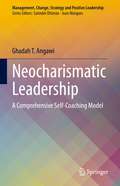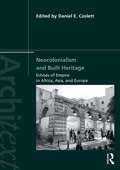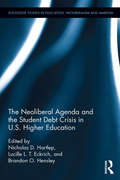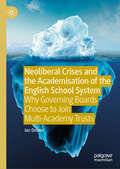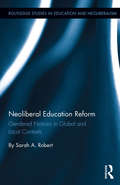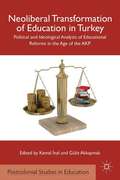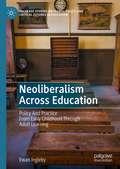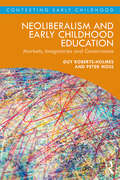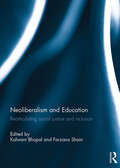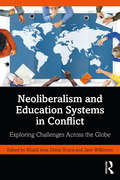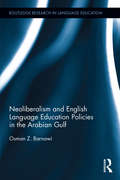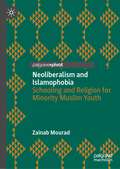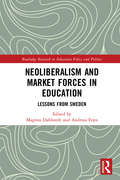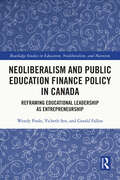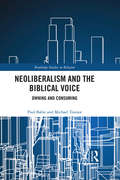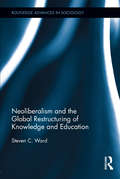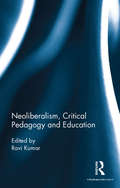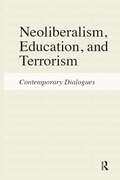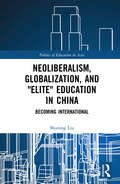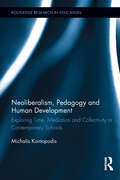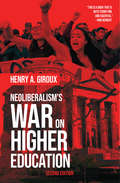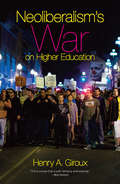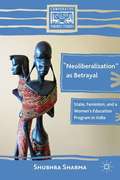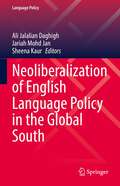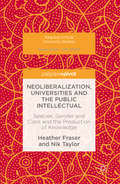- Table View
- List View
Neocharismatic Leadership: A Comprehensive Self-Coaching Model (Management, Change, Strategy and Positive Leadership)
by Ghadah T. AngawiThis book introduces the theory of Neocharismatic leadership through a conceptual framework based on research and literature review. This is followed by a gradient of leadership developmental sessions. In the folds, the sessions transcend the leaders to the Neocharismaitc leadership model application through a set of ten behavioral roles across 3 stages. In total, the book comprises of 32 self-coaching sessions that can be conducted by leaders themselves or by other coaches who work with leaders. This all comes alongside explanations, connotations and stories of success. The sessions allow leaders to connect with global and ethical issues and align them with their purpose. In essence, the book addresses, in its folds, the ethical and moral leadership behavior in modern organizations as they interact with stakeholders and make strategic transformational decisions that can affect the global community.
Neocolonialism and Built Heritage: Echoes of Empire in Africa, Asia, and Europe (Architext)
Architectural relics of nineteenth and twentieth-century colonialism dot cityscapes throughout our globalizing world, just as built traces of colonialism remain embedded within the urban fabric of many European capitals. Neocolonialism and Built Heritage addresses the sustained presence and influence of historic built environments and processes inherited from colonialism within the contemporary lives of cities in Africa, Asia, and Europe. Novel in their focused consideration of ways in which these built environments reinforce neocolonialist connections among former colonies and colonizers, states and international organizations, the volume’s case studies engage highly relevant issues such as historic preservation, heritage management, tourism, toponymy, and cultural imperialism. Interrogating the life of the past in the present, authors thus challenge readers to consider the roles played by a diversity of historic built environments in the ongoing asymmetrical balance of power and unequal distribution capital around the globe. They present buildings’ maintenance, management, reuse, and (re)interpretation, and in so doing they raise important questions, the ramifications of which transcend the specifics of the individual sites and architectural histories they present.
The Neoliberal Agenda and the Student Debt Crisis in U.S. Higher Education: Indebted Collegians of the Neoliberal American University (Routledge Studies in Education, Neoliberalism, and Marxism)
by Nicholas D. Hartlep Lucille L.T. Eckrich Brandon O. HensleyCapturing the voices of Americans living with student debt in the United States, this collection critiques the neoliberal interest-driven, debt-based system of U.S. higher education and offers alternatives to neoliberal capitalism and the corporatized university. Grounded in an understanding of the historical and political economic context, this book offers auto-ethnographic experiences of living in debt, and analyzes alternatives to the current system. Chapter authors address real questions such as, Do collegians overestimate the economic value of going to college? and How does the monetary system that student loans are part of operate? Pinpointing how developments in the political economy are accountable for students’ university experiences, this book provides an authoritative contribution to research in the fields of educational foundations and higher education policy and finance.
Neoliberal Crises and the Academisation of the English School System: Why Governing Boards Choose to Join Multi-Academy Trusts
by Ian DewesThis book examines the impact of neoliberalism on the academisation of the English school system. The growth of multi-academy trusts (MATs) has been a significant change in the English educational landscape. While some schools have been forced to join MATs, many of them have made this change because their governing board has chosen to do so. The author of this book examines the reasons why many governing bodies have still decided to join a MAT, despite numerous controversies linked to them. He applies the theory that neoliberalism perpetuates itself by creating crises which require more neoliberal policy solutions. Using three case-study schools, the extent to which various crises in the English education system have encouraged governing boards to join MATs is studied. The book will be of interest to academics and students of education policy, schooling, and the sociology of education.
Neoliberal Education Reform: Gendered Notions in Global and Local Contexts (Routledge Studies in Education, Neoliberalism, and Marxism)
by Sarah A. RobertThe restructuring of teaching is a global issue, the result of a transnational movement of policy. Gender shapes the occupational reform and binds the global-to-the-local movement of reform ideas. Gender is also implicated in how policy is done and how it leads to particular outcomes. This volume examines the behind-the-scenes work done to make sense of reform and implement it during the workday and questions the new forms and controls over teaching reforms—the labor process—revealed to understand the implications of neoliberal education reform on teachers’ work. Based on ethnographic research undertaken at public high schools in Argentina, this volume introduces the everyday work lives of teachers. It includes interviews and observations revealing what it means to be a teacher in the reform context, and explores the ways masculinities and femininities shape teachers’ decision-making about reforms. At a time when teachers are at the center of political controversy around the world, this volume is an important reminder that school change is about changing the work of teachers.
Neoliberal Transformation of Education in Turkey: Political and Ideological Analysis of Educational Reforms in the Age of the AKP (Palgrave Macmillan’s Postcolonial Studies in Education)
by Güliz Akkaymak Kemal İnalNeoliberal policies have had an impact on educational systems globally. This book provides a detailed and critical analysis of neoliberal educational policies and reforms in Turkey by focusing on the Justice and Development Party's reform efforts over the last eight years.
Neoliberalism Across Education: Policy And Practice From Early Childhood Through Adult Learning (Palgrave Studies on Global Policy and Critical Futures in Education)
by Ewan InglebyThis book explores the impact of neoliberalism on education in the UK. Drawing on policies across the sector in England as a case study, the author illuminates and analyses the development of neoliberal policy on models of practice. The author explores the theory and philosophy that have come to define neoliberalism, and offers an explanation as to how this has been applied to the education sector in England at various different stages. Informed and scaffolded by years of empirical research in educational contexts, this book interrogates the impact of neoliberalism on educational practice. It will be of interest and value to scholars of neoliberalism and education, as well as practitioners.
Neoliberalism and Early Childhood Education: Markets, Imaginaries and Governance (Contesting Early Childhood)
by Guy Roberts-Holmes Peter MossNeoliberalism, with its worldview of competition, choice and calculation, its economisation of everything, and its will to govern has ‘sunk its roots deep’ into Early Childhood Education and Care. This book considers its deeply detrimental impacts upon young children, families, settings and the workforce. Through an exploration of possibilities for resistance and refusal, and reflection on the significance of the coronavirus pandemic, Roberts-Holmes and Moss provide hope that neoliberalism’s current hegemony can be successfully contested. The book provides a critical introduction to neoliberalism and three closely related and influential concepts – Human Capital theory, Public Choice theory and New Public Management – as well as an overview of the impact of neoliberalism on compulsory education, in particular through the Global Education Reform Movement. With its main focus on Early Childhood Education and Care, this book argues that while neoliberalism is a very powerful force, it is ‘deeply problematic, eminently resistible and eventually replaceable’ – and that there are indeed alternatives. Neoliberalism and Early Childhood Education is an insightful supplement to the studies of students and researchers in Early Childhood Education and Sociology of Education, and is also highly relevant to policy makers.
Neoliberalism and Education: Rearticulating Social Justice and Inclusion
by Kalwant Bhopal and Farzana ShainNeoliberalism and Education: Rearticulating Social Justice and Inclusion offers a critical reflection on the establishment of neoliberalism as the new global orthodoxy in the field of education, and considers what this means for social justice and inclusion. It brings together writers from a number of countries, who explore notions of inclusion and social justice in educational settings ranging from elementary schools to higher education. Contributors examine policy, practice, and pedagogical considerations covering different dimensions of (in)equality, including disability, race, gender, and class. They raise questions about what social justice and inclusion mean in educational systems that are dominated by competition, benchmarking, and target-driven accountability, and about the new forms of imperialism and colonisation that both drive, and are a product of, market-driven reforms. While exposing the entrenchment, under current neoliberal systems of educational provision, of longstanding patterns of (racialised, classed, and gendered) privilege and disadvantage, the contributions presented in this book also consider the possibilities for hope and resistance, drawing attention to established and successful attempts at democratic education or community organisation across a number of countries. This book was originally published as a special issue of the British Journal of Sociology of Education.
Neoliberalism and Education Systems in Conflict: Exploring Challenges Across the Globe (Educational Leadership and Policy Decision-Making in Neoliberal Times)
by Jane Wilkinson Khalid Arar Deniz ÖrücüNeoliberalism and Education Systems in Conflict: Exploring Challenges Across the Globe explores how neoliberal values are imprinted onto educational spaces and practices, and by consequence, fundamentally reshape how we come to understand the educational experience at the school or system level. Countries across the globe struggle with the residual effects of increased accountability, choice/voucher systems, and privatization. The first section of the book discusses the direct imprint of neoliberal policies on educational spaces. The next section examines the more indirect outcomes of neoliberalism, including the challenges of inequity, access, violence, racism, and social justice issues as a result of neoliberal ideologies. Each section of the book includes case studies about education systems across the globe, including Britain, Middle East, Turkey, United States, China, and Chile written by international contributors. Neoliberalism and Education Systems in Conflict is essential reading for educators, scholars, and faculty of educational leadership and policy globally.
Neoliberalism and English Language Education Policies in the Arabian Gulf (Routledge Research in Language Education)
by Osman Z. BarnawiOver the past two decades, the Arabian oil-rich Gulf countries have faced enormous social, political, economic, cultural, religious, ideological and epistemological upheaval. Through detailed, critical comparative investigation, Neoliberalism and English Language Education Policies in the Arabian Gulf examines the impact of such disruption on education policies in a political and economic union, consisting of six countries: Saudi Arabia, the United Arab Emirates, Oman, Qatar, Bahrain and Kuwait. Using data collected from a wide range of sources, this thought-provoking book documents the inner workings of neoliberalism across a strategic geographical area of the Islamic world. The book teases apart the complex issues surrounding the ways in which access to English has been envisioned, contested, and protected from being challenged among different players within and between the Gulf countries. Osman Z. Barnawi explores the intensifying ideological debates between Islamic culture and Western neoliberal values, and questions whether Islamic values and traditions have been successfully harmonised with neoliberal capitalist development strategies for nation building in the Arabian Gulf region. Neoliberalism and English Language Education Policies in the Arabian Gulf will be of interest to academics, researchers and postgraduates working in the fields of language education and, more specifically, TESOL, applied linguistics, education policy, and teacher education.
Neoliberalism and Islamophobia: Schooling and Religion for Minority Muslim Youth
by Zainab MouradThis book explores the ways in which dynamics of Islamophobia and neoliberalism shape the schooling experiences of minority Muslim students in Sydney primary, public and independent schools. The author examines the issues at macro, meso and micro level. At the global systemic level, the book discusses the politics of naming Muslims and racialised governmentality within a capitalist neoliberal context. At the institutional level, it provides an insight into the Living Safe Together policy and explains how it can potentially provide space for teachers to abuse their authority or power in schools over minority Muslim students, within a wider discursive context shrouded by national security discourses, ‘homegrown’ terrorism and deradicalisation. Finally, at the individual level, drawing on the voices of teachers and Muslim students, the book highlights how Islamophobic discourse was reinforced through pedagogical practices, and how Muslim students resisted these discourses by speaking back to power.
Neoliberalism and Market Forces in Education: Lessons from Sweden (Routledge Research in Education Policy and Politics)
by Magnus Dahlstedt Andreas FejesNeoliberalism and Market Forces in Education provides a wide perspective on the dramatic transformation of education policy in Sweden that has taken place during the last 30 years, with a specific focus on marketization. The marketization of education in Sweden is set in the wider international context of changes in education systems. With contributions from researchers across a wide range of scientific disciplines, the book provides examples of the consequences of market orientation in education in terms of increase in inequality as well as in terms of what the market orientation means for principals, teachers and students. It considers how Sweden has developed one of the most marketized education systems in the world and the possible consequences of such processes, as identified by research. Neoliberalism and Market Forces in Education will be of great interest to educational practitioners, politicians, scholars in the field, and postgraduate and research students in education.
Neoliberalism and Public Education Finance Policy in Canada: Reframing Educational Leadership as Entrepreneurship (Routledge Studies in Education, Neoliberalism, and Marxism)
by Wendy Poole Vicheth Sen Gerald FallonThis book uses a multi-dimensional conceptual framework to demonstrate how neoliberal forces have been manifested through changes to K–12 public education finance policy in British Columbia, Canada between 2001 and 2015. The text offers in-depth critical policy analysis to illustrate how the public education system has been impacted by the emergence of a hybrid model of public-private funding. By examining the impacts of this neoliberalized model, in which school districts must compete for public funding and engage in for-profit activities, the book highlights emerging financial inequalities; exacerbated inequities for students; increased entrepreneurialism; closer alignment of administrators’ subjectivities with a managerial approach to educational leadership; and an illusion of local autonomy. Ultimately, the text makes powerful contributions by calling attention to detrimental processes of neoliberalization, marketization, and privatization within public education, as well as the managerialization of educational leadership. This text will benefit researchers, academics, educators, and educational leaders with an interest in the politics of education policy and finance, school district leadership, international and comparative education, and the sociology of education.
Neoliberalism and the Biblical Voice: Owning and Consuming (Routledge Studies in Religion)
by Paul Babie Michael TrainorThis book compares our contemporary preoccupation with ownership and consumption with the role of property and possessions in the biblical world, contending that Christian theology provides a valuable entry point to discussing the issue of private property—a neoliberal tool with the capacity to shape the world in which we live by exercising control over the planet’s resources. Babie and Trainor draw on the teaching on property and possessions of Jesus of Nazareth. They demonstrate how subsequent members of the Jesus movement—the writers of early collection of Jesus sayings (called ‘Q’), and the gospels of Mark and Luke—reformulated Jesus’ teaching for different contexts that was radical and challenging for their own day. Their view of wealth and possessions continues today to be as relevant as ever. By placing the insights of the Galilean Jesus and the early Jesus movement into conversation with contemporary views on private property and consumer culture, the authors develop legal, philosophical and theological insights, what they describe as ‘seven theses’, into how our desire for ethical living fares in the neoliberal marketplace.
Neoliberalism and the Global Restructuring of Knowledge and Education (Routledge Advances in Sociology)
by Steven C. WardThis book examines the influence of neoliberal ideas and practices on the way knowledge has been conceptualized, produced, and disseminated over the last few decades at different levels of public education and in various national contexts around the world.
Neoliberalism, Critical Pedagogy and Education
by Ravi KumarThis volume examines the role of neoliberalism and its impact on education in South Asia. It contends that education is in a state of crisis across the world. This is reflected not only in the way the state has withdrawn to pave way for private capital but also in the manner in which knowledge and ways of understanding the world are being challenged by manipulation and adverse influences. A process of ‘factoryisation’ is underway as disciplining of human minds and redefinition of the purpose of human existence are being geared to fall in line with the needs of private capital. The book brings together incisive contributions from India, Sri Lanka, Pakistan and Nepal to explore newer possibilities to deal with the educational crisis, and looks at a range of critical themes in education: pedagogy, teacher–learner relationship, teacher education, the state of the university, and policy. Rich in content, critical and insightful, this book will be a valuable addition for scholars and researchers of education and education policy, sociology, public policy and South Asian Studies.
Neoliberalism, Education, and Terrorism: Contemporary Dialogues
by Henry A. Giroux Kenneth J. Saltman Sophia A Mcclennen Jeffrey R. Di LeoNeoliberalism, Education, Terrorism: Contemporary Dialogues is a collaborative effort among four established public intellectuals who deeply care about the future of education in America and who are concerned about the dangerous effects of neoliberalism on American society and culture. It aims to provide a clear, concise, and thought-provoking account of the problems facing education in America under the dual shadows of neoliberalism and terrorism. Through collaborative and individual essays, the authors provide a provocative account that will be of interest to anyone who concerning with the opportunities and dangers facing the future of education at this critical moment in history.
Neoliberalism, Globalization, and "Elite" Education in China: Becoming International (Politics of Education in Asia)
by Shuning LiuThis book examines the practices and effects of emerging international curriculum programs established by Chinese elite public high schools and supported by China’s New Curriculum Reform and the Chinese-Foreign Cooperation in Running Schools (CFCRS) policy. Drawing on critical theory, the book applies sociological and anthropological approaches to the study of the educational practices of such curriculum programs and the rising Chinese elite class, as well as educational policy globally. Through analyzing a wide variety of data sources, this book focuses on examining how changing local and global contexts have influenced and shaped the educational opportunities, experiences, and aspirations of privileged urban Chinese students who are able to attend these programs and who hope to study at U.S. universities. In doing so, the book is intended to define the problematics of the internationalization of Chinese education and an emergent form of elite education in China, which are complex and embedded in the process of modernization in China. Neoliberalism, Globalization, and "Elite" Education in China: Becoming International will appeal to undergraduates, postgraduates, and academics in the fields of curriculum studies, educational policy studies, sociology of education, and anthropology of education, as well as policymakers with an interest in globalization and education, education policy, and education and international development.
Neoliberalism, Pedagogy and Human Development: Exploring Time, Mediation and Collectivity in Contemporary Schools (Routledge Research in Education)
by Michalis KontopodisIn most Western developed countries, adult life is increasingly organized on the basis of short-term work contracts and reduced social security funds. In this context it seems that producing efficient job-seekers and employees becomes the main aim of educational programs for the next generation. Through case studies of young people from urban and countryside marginalized populations in Germany, USA and Brazil, this book investigates emerging educational practices and takes a critical stance towards what can be seen as neoliberal educational politics. It investigates how mediating devices such as CVs, school reports, school files, photos and narratives shape the ways in which those marginalized students reflect about their past as well as imagine their future. By building on process philosophy and time theory, post-structuralism, as well as on Vygotsky's psychological theory, the analysis differentiates between two discrete modes of human development: development of concrete skills (potential development) and development of new societal relations (virtual development, which is at the same time individual and collective). The book outlines an innovative relational account of learning and human development which can prove of particular importance for the education of marginalized students in today's globalized world.
Neoliberalism's War on Higher Education
by Henry A. GirouxAn accessible examination of neoliberalism and its effects on higher education and America, by the author of American Nightmare.Neoliberalism&’s War on Higher Education reveals how neoliberal policies, practices, and modes of material and symbolic violence have radically reshaped the mission and practice of higher education, short-changing a generation of young people. Giroux exposes the corporate forces at play and charts a clear-minded and inspired course of action out of the shadows of market-driven education policy. Championing the youth around the globe who have dared to resist the bartering of their future, he calls upon public intellectuals—as well as all people concerned about the future of democracy—to speak out and defend the university as a site of critical learning and democratic promise.&“Giroux has focused his keen intellect on the hostile corporate takeover of higher education in North America . . . .He is relentless in his defense of a society that requires its citizenry to place its cultural, political, and economic institutions in context so they can be interrogated and held truly accountable. We are fortunate to have such a prolific writer and deep thinker to challenge us all.&”―Karen Lewis, President, Chicago Teachers Union &“No one has been better than . . . Giroux at analyzing the many ways in which neoliberalism . . . has damaged the American economy and undermined its democratic processes.&”―Bob Herbert, Distinguished Senior Fellow at Demos &“Giroux . . . dares us to reevaluate the significance of public pedagogy as integral to any viable notion of democratic participation and social responsibility. Anybody who is remotely interested in the plight of future generations must read this book.&”―Dr. Brad Evans, Director, Histories of Violence website
Neoliberalism's War on Higher Education
by Henry A. GirouxNeoliberalism's War on Higher Education reveals how neoliberal policies, practices, and modes of material and symbolic violence have radically reshaped the mission and practice of higher education, short-changing a generation of young people.Giroux exposes the corporate forces at play and charts a clear-minded and inspired course of action out of the shadows of market-driven education policy. Championing the youth around the globe who have dared to resist the bartering of their future, he calls upon public intellectuals-as well as all people concer ned about the future of democracy-to speak out and defend the university as a site of critical learning and democratic promise.
"Neoliberalization" as Betrayal: State, Feminism, and a Women’s Education Program in India (Comparative Feminist Studies)
by Shubhra SharmaThis book is concerned with the three-way relationship between neoliberalism, women's education, and the spatialization of the state, and analyses this through an ethnography lens of women's education programs in India.
Neoliberalization of English Language Policy in the Global South (Language Policy #29)
by Ali Jalalian Daghigh Jariah Mohd Jan Sheena KaurThis book investigates different ways in which neoliberal language and teaching policies have influenced the English language in global south countries across Asia, Africa and Latin America. Through the three main sub themes covered by the book, namely Neoliberalism and English Language Teaching Policies, Neoliberalism Ideology as in English Language Teaching Materials, and Experiences of Neoliberal Subjects, it investigates various aspects and means through which neoliberalism is realized in a variety of contexts.Through the first subtheme the volume covers the English language education policies of Chile, Bangladesh, India, and Morocco. The second sub theme concerns how different neoliberal values such as consumerism, entrepreneurship, and individualism are localized and constructed in the locally developed English language materials of Thailand, Taiwan, Malaysia, and Vietnam. The third sub theme includes studies on the impact of neoliberalization of English in relation to Colombian, Brazilian, and Pakistani stakeholders. This book is a valuable resource for academics, postgraduate students, researchers, policy makers, educators, and practitioners who are interested in neoliberalism in English language.
Neoliberalization, Universities and the Public Intellectual
by Heather Fraser Nik TaylorThis book employs an an intersectional feminist approach to highlight how research and teaching agendas are being skewed by commercialized, corporatized and commodified values and assumptions implicit in the neoliberalization of the academy. The authors combine 50 years of academic experience and focus on species, gender and class as they document the hazardous consequences of seeing people as instruments and knowledge as a form of capital. Personal-political examples are provided to illustrate some of the challenges but also opportunities facing activist scholars trying to resist neoliberalism. Heartfelt, frank, and unashamedly emotional, the book is a rallying cry for academics to defend their role as public intellectuals, to work together with communities, including those most negatively affected by neoliberalism and the corportatization of knowledge.
